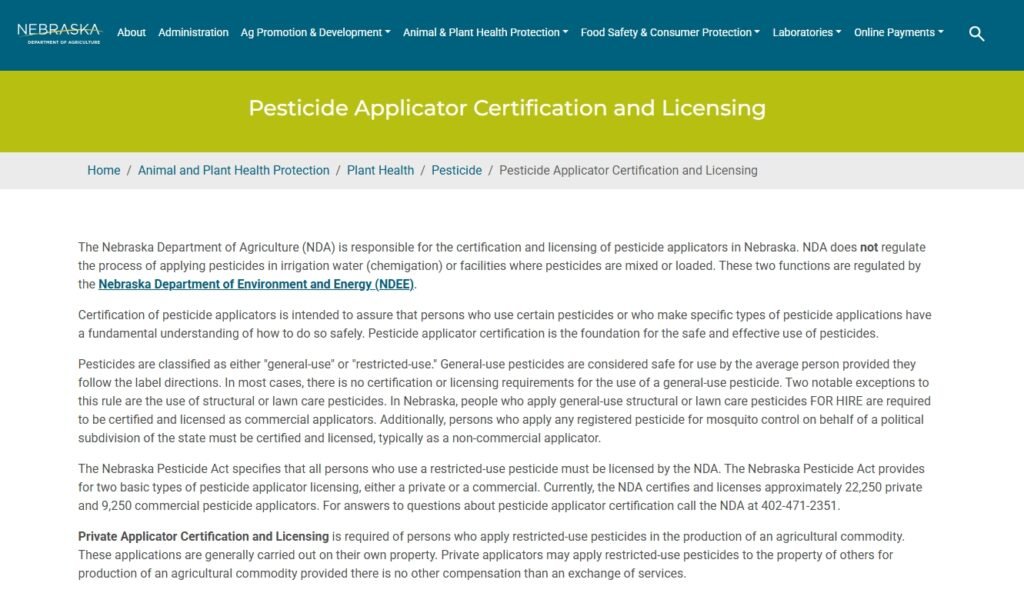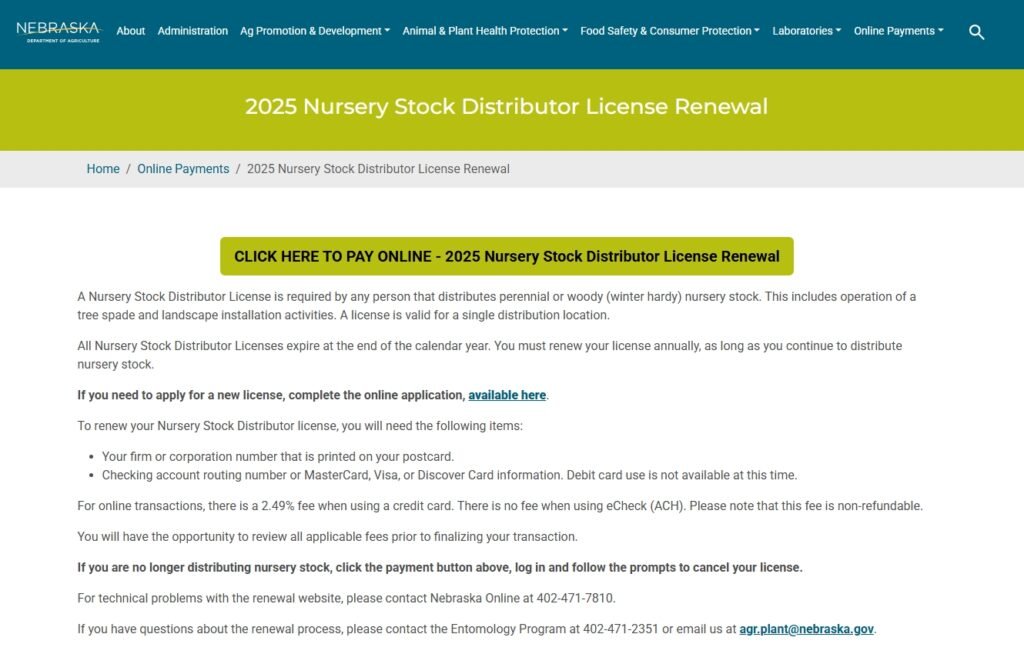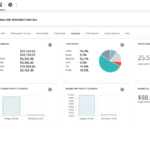Introduction
Have you ever dreamed of turning Nebraska yards into lush, green, & welcoming outdoor spaces? Starting a landscaping business in the Cornhusker State can be rewarding, but before you take your chance, there are legal and regulatory steps you need to know.
Nebraska doesn’t require a general landscaping license, but if your services include pesticide application or selling nursery plants, you’ll need to meet certain criteria, which include certification and registration requirements.
This guide breaks down what you’ll need to operate legally and professionally.
Licensing Requirements for Landscaping in Nebraska
a. Landscaping Business
i. Landscape Contractor License
Nebraska does not require a statewide landscaping contractor license for general services, such as mowing, planting, or mulching. However, if you plan to build hardscape or irrigation and local permits are required, check with your city or county zoning/building department—some localities may require contractor permits.
ii. License Levels by Project Size
The state doesn’t tier landscaper licenses by project size (like Arkansas), but local regulations may have size-based permit rules. Always check with your specific county or city planning office.
iii. Subcontractor Exemptions
If you work under a licensed general contractor, you usually don’t need your own landscaper license though for pesticide work or plant selling, a separate certification or license is required.
b. Pest Control
If your landscaping includes applying herbicides, fungicides, or insecticides, whether restricted-use or general-use, you must be licensed by the Nebraska Department of Agriculture (NDA).

You can visit the official website of Nebraska Department of Agriculture to know more about Pesticide Applicator Certification and Licensing.
i. Commercial Applicator License
A Commercial Applicator license is mandatory if you apply pesticides for compensation or contract on someone else’s property, even for general-use products like lawn herbicides.
You must pass the General Standards exam plus at least one category-specific exam (e.g., Ornamental & Turf, Structural Pest Control) with a minimum score of 70%.
The license fee is $90 and is valid for three years.
ii. Private & Non‑Commercial Applicator Options
Private applicator license ($25 fee) covers restricted-use pesticide use only on land you or your employer owns—and you cannot be compensated.
Non-commercial applicator license is free and applies if you treat property you don’t own, but as part of your employment for the government or employer—no fee required.
iii. Recertification
Applicable licenses expire every three years, and you’ll need to retake exams or training to renew. No ongoing continuing education is currently required.
c. Nursery Stock/Plant Sales
If your business involves distributing nursery stock, including trees, shrubs, bulbs, woody perennials, or planting stock, you must be licensed with the NDA.
i. Nursery Stock Distributor License
Managing as a Nursery Stock Distributor in Nebraska requires a license for each physical location you distribute. The license is valid only for a year (till 31st December) and should be renewed annually.

Visit the official website of Nebraska Department of Agriculture to know more about the renewal of Nursery Stock Distributor License.
Base fee is up to $140 for the first acre, plus approximately $6 per additional acre. If you don’t actually hold plants at that location (like landscaping services that only install), you still pay on a nominal one-acre basis.
ii. Obligations & Labeling
You must follow labeling rules, maintain plant health standards, only source plants from licensed distributors or approved growers, and keep plant transaction records for 3 years—including varieties, origins, dates, and suppliers.
d. Other Requirements
i. Surety Bond
Nebraska’s licenses don’t specifically require surety bonds; however, proof of financial responsibility, especially insurance, is often necessary for pesticide licensing or local contractor permits.
ii. Insurance
While general liability insurance isn’t mandated statewide for landscapers, it’s very wise—and may be required by clients or cities:
- Typical coverage might include $100,000 bodily injury, $50,000 property damage, and $5,000 medical payments.
- NDA requires proof of financial responsibility for commercial pesticide applicators (typically insurance or bond).
iii. Business Registration
Legally operating in Nebraska involves:
- Choosing your business structure (sole proprietorship, LLC, etc.)
- Registering with the Nebraska Secretary of State
- Obtaining a State Tax ID / EIN if hiring employees or collecting sales tax
Also, local cities may require a general business license—even if you don’t need a landscaping license.
Important Links You Should Know
Here are helpful Nebraska official websites for licensing and registration:
- Pesticide Applicator Certification & Licensing: Which pesticide applicator license do I need? (NDA guide including general & category exams, fees, exam schedules).
- Pesticide Safety Education Program: Do you need I applicator license?
- Nebraska Department of Agriculture: Information about Nursery Certification Program.
- Nebraska Nursery & Landscape Association: Who Needs a Nebraska Nursery License?
- Nebraska Statutes Chapter 2‑1091: Legal requirements and licensing rules for nursery distributors.
Landscaping Associations in Nebraska
nnla
Consider joining the Nebraska Nursery & Landscape Association (NNLA):
- Access industry training, updates, networking, and business resources.
- Get help understanding licensing, plant sourcing, and regulations.
- They often host events and offer resources for both landscapers and nursery businesses.
Notes & Beginner Checklist
- Nebraska does not require a state landscaper license, unless pesticide use or nursery sales are involved.
- If you apply pesticides for hire, obtain a Commercial Applicator License ($90, valid 3 years).
- If you only use restricted-use pesticides on property you control and don’t charge, you may use a Private Applicator license ($25, 3‑year validity).
- If your employees apply pesticides under your business umbrella, they each need licensure per category.
- If you distribute plants, obtain a Nursery Stock Distributor license at each location and pay annual fees based on acreage.
- Maintain required records for pesticide use (3 years) and plant transactions.
- Carry liability and financial responsibility insurance—particularly for pesticide work.
- Register your business entity with the Nebraska Secretary of State; check local city licensing requirements.
License turnaround typically takes a few days to a few weeks, depending on NDA processing. Fees range from $25–$140/year per license or acre.





